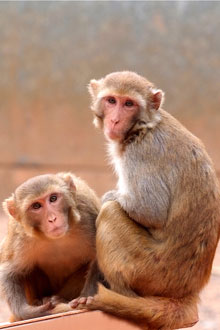
If a monkey's social status changes, her immune system changes along with it. Scientists studying rhesus macaques at the Yerkes National Primate Research Center say they can predict a rhesus macaque's rank within a small group by examining gene expression levels in her immune cells.
This finding may have implications for how the stress of low socioeconomic status affects human health and how individuals' bodies adapt after a shift in their social environment. The results are published this week in the Proceedings of the National Academy of Sciences Early Edition.
The lead author of the study is Jenny Tung, who was at the University of Chicago during the study and is now assistant professor of evolutionary anthropology at Duke University. Co-authors include Yoav Gilad, associate professor of human genetics at the University of Chicago, and Mark Wilson, chief of the Division of Developmental and Cognitive Neuroscience at Yerkes and director of the center's Biomarkers Core Laboratory.
Primate researchers can tell macaques' social rank by watching them engage in competitive interactions, such as grooming and accessing food and water. Tung and her colleagues studied 10 groups of female macaques (five each) in which researchers could manipulate individuals' social rank. Before being placed into new groups, all of the macaques started out as middle rank.
"In the wild, macaques inherit their social rank from their mothers" Tung says. "But in our research, the order of introduction determines rank; the newcomer is generally lower status. When some macaques' status changed after a newcomer arrived, so did their patterns of immune system gene activity."
The researchers used microarrays, a technology that allows them to scan thousands of genes and read the expression levels, to look at the macaques' immune cells. The genes whose activity that changed the most depending on social rank were those involved in controlling inflammation. Previous studies have found lower status macaques have higher levels of inflammation and have changes in their levels of hormones that indicate they're under more stress.
Based on the pattern of gene activity, the researchers could, without looking at a monkey's identity, predict whether that animal was high (rank 1 or 2), middle or low (rank 4 or 5) with 80 percent accuracy.
Seven monkeys' social ranks changed because other individuals were moved. When this happened, the researchers were able to take blood samples before and after the shift. The gene scans revealed the pattern of immune system activity changed along with these monkeys' social ranks. Here, social rank post-shift could be predicted to 86 percent accuracy (six out of seven).
"There's a concerning side to this kind of research, in that an individual's social environment probably partially determines health status," Tung says. "But there's also a hopeful side. For the seven females that changed ranks, their gene status changed with them."
Wilson adds, "That they are not stuck in place says something more broadly about the capacity for change within human society. With these studies, we are showing we do have the ability to advance from our roots and live more healthful lives."
Tung and her colleagues plan to continue studying how social rank and stress in macaques affect immune responses and susceptibility to infection. The National Institutes of Health supported this research.
Reference: J. Tung, L.B. Barreiro, Z.P. Johnson, K.D. Hansen, V. Michopoulos, D. Toufexis, K. Michelini, M.E. Wilson and Y. Gilad. Social environment is associated with gene regulatory variation in the rhesus macaque immune system. PNAS Early Edition (2012).
